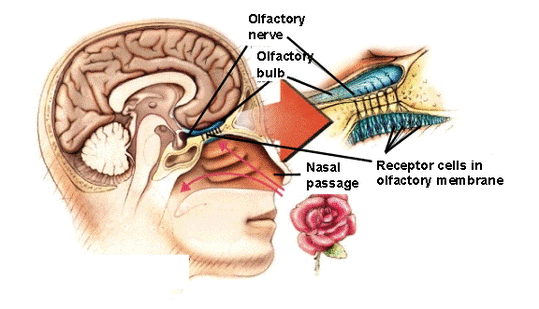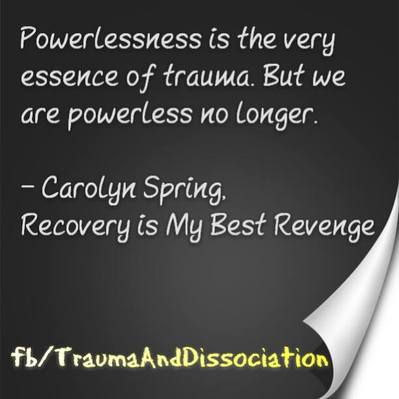Psychology of Smell

Dr. Alan R. Hirsch, a neurologist, psychiatrist, researcher & expert in smell and taste, writes how "Smells are one of the quickest ways to change mood and emotion and can induce memories." They can also change one's memory, so as to remove the trauma.
Our sense of smell is estimated to be 10,000 times more acute than our other senses with sensitivity to some 10,000 chemical compounds.............. Scents travel more quickly to the brain than do stimuli from sight or sound. The odors induce parts of the brain to stimulate the release of hormones and neuro-chemicals which alters body physiology and therefore human behavior.
Most of the brain’s neurotransmitters are located in the olfactory bulb, providing further evidence of the link between human emotions and our sense of smell (Hirsh, 1997).
Odors also stimulate the hypothalamus-pituitary axis which allows modulation for dopamine, serotonin, catecholamine and other hormone levels. Certain Essential oils are especially high in sesquiterpenes which have the ability to cross the blood -brain barrier.
The sense of smell is described differently from the other four senses as it is the only one that is directly linked to the limbic lobe of the brain, the emotional control center. Emotions such as anxiety, depression, fear, anger and joy all emanate from this region. Dr Hirsch points out that odors impact all of us whether we like it or not. They influence us in a preconscious way and create impressions- especially in relationships to others.
Fear conditioning is thought to depend upon an area of the brain called the amygdala, as researched by scientist, researcher Joseph LeDoux. Recent research has further supported a crucial role for the amygdala in fear conditioning. In other words, fear and trauma are specifically located in the amygdala.
Because the olfactory bulb is part of the brain's limbic system, an area so closely associated with memory and feeling it's sometimes called the "emotional brain," smell can call up memories and powerful responses almost instantaneously.
The olfactory bulb has intimate and direct access to the amygdala, which processes emotion, and the hippocampus, which is responsible for associative learning. Both the amygdala and the hippocampus are impacted during PTSD. Despite the tight wiring, however, smells would not trigger memories if it weren't for conditioned responses. When you first smell a new scent, you link it to an event, a person, a thing or even a moment. Your brain forges a link between the smell and a memory -- associating a smell with a memory.
We actually begin making associations between smell and emotion before we're even born! Our sense of smell is our most potent sense of all. Aromas produce distinctive psychological & physical effects that influence one's mood, wakefulness, anxiety etc.
Our sense of smell is estimated to be 10,000 times more acute than our other senses with sensitivity to some 10,000 chemical compounds.............. Scents travel more quickly to the brain than do stimuli from sight or sound. The odors induce parts of the brain to stimulate the release of hormones and neuro-chemicals which alters body physiology and therefore human behavior.
Most of the brain’s neurotransmitters are located in the olfactory bulb, providing further evidence of the link between human emotions and our sense of smell (Hirsh, 1997).
Odors also stimulate the hypothalamus-pituitary axis which allows modulation for dopamine, serotonin, catecholamine and other hormone levels. Certain Essential oils are especially high in sesquiterpenes which have the ability to cross the blood -brain barrier.
The sense of smell is described differently from the other four senses as it is the only one that is directly linked to the limbic lobe of the brain, the emotional control center. Emotions such as anxiety, depression, fear, anger and joy all emanate from this region. Dr Hirsch points out that odors impact all of us whether we like it or not. They influence us in a preconscious way and create impressions- especially in relationships to others.
Fear conditioning is thought to depend upon an area of the brain called the amygdala, as researched by scientist, researcher Joseph LeDoux. Recent research has further supported a crucial role for the amygdala in fear conditioning. In other words, fear and trauma are specifically located in the amygdala.
Because the olfactory bulb is part of the brain's limbic system, an area so closely associated with memory and feeling it's sometimes called the "emotional brain," smell can call up memories and powerful responses almost instantaneously.
The olfactory bulb has intimate and direct access to the amygdala, which processes emotion, and the hippocampus, which is responsible for associative learning. Both the amygdala and the hippocampus are impacted during PTSD. Despite the tight wiring, however, smells would not trigger memories if it weren't for conditioned responses. When you first smell a new scent, you link it to an event, a person, a thing or even a moment. Your brain forges a link between the smell and a memory -- associating a smell with a memory.
We actually begin making associations between smell and emotion before we're even born! Our sense of smell is our most potent sense of all. Aromas produce distinctive psychological & physical effects that influence one's mood, wakefulness, anxiety etc.

